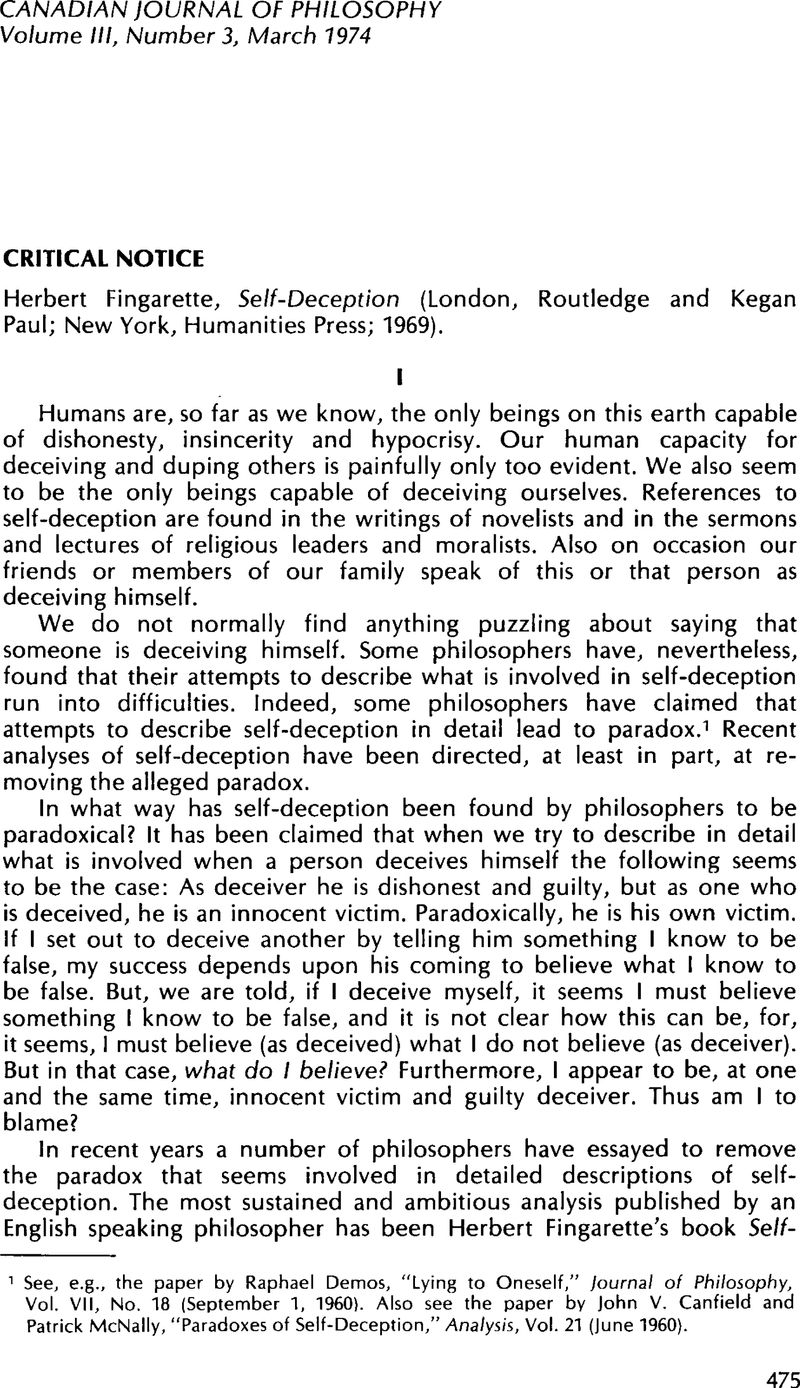No CrossRef data available.
Article contents
Herbert Fingarette Self-Deception (London, Routledge and Kegan Paul; New York, Humanities Press; 1969).
Review products
Published online by Cambridge University Press: 01 January 2020
Abstract

- Type
- Critical Notice
- Information
- Copyright
- Copyright © The Authors 1974
References
1 See, e.g., the paper by Demos, Raphael “Lying to Oneself,” journal of Philosophy, Vol. VII, No. 18 (September 1, 1960)Google Scholar. Also see the paper by Canfield, John V. and McNally, Patrick “Paradoxes of Self-Deception,” Analysis,Vol. 21 (June 1960).Google Scholar
2 Fingarette, Herbert Self-Deception(London: Routledge and Kegan Paul; New York: Humanities Press, 1969).Google Scholar
3 Ibid., p. 5.
4 Ibid., p. 34.
5 Ibid., pp. 34-36.
6 Ibid., p. 62.
7 Ibid., p. 64.
8 Ibid., pp. 66-67.
9 Ibid., p. 53.
10 When Fingarette says that the self-deceiver is not intentionally wrong in the way he spells-out his engagement, but rather is wrong purposely, it is not clear what he means. One gets the impression at times that he is opting for “unconscious purposes” or something of that sort. It is difficult to see how one can make mistakes purposely and not be aware of it. One might be able to explain a consistent pattern of error by reference to fear and/or desire, but this, as far as I can see, should not require use of an idiom such as “purposely wrong.”
11 Consider, e.g., the lengthy example Fingarette quotes on pp. 3-4 of Self-Deception. It is fairly typical of the sorts of examples that he considers. It is drawn from the literature of Psychopathy and involves the case of a man whose hostilities toward people he feels have wronged him are so repressed that he can express these hostilities only when drugged. When he is not drugged he is not even aware of the resentment which apparently is in part a source of his bedridden condition. The case as is developed in full in the text strikes one as an example of a man who is suffering from a psychological disorder of a more serious nature than self-deception. In any event, it is not a case we would usually consider as a central clear-cut case of self-deception.
In addition to the fact that Fingarette uses many examples drawn from case histories in psychopathology, he also includes an appendix to his book about the effects of cutting the main nerve passages between the two hemispheres of the brain. He suggests that there is a “neuropsychological context of self-deception.” It is not clear what Fingarette thinks the material in this appendix is supposed to show, but he seems to think it supports his analysis of self-deception. It is revealing that he should have felt this sort of data was relevant to his analysis of self-deception. It adds support to my claim, I think, that Fingarette is preoccupied with the abnormal case and as a result, overlooks the more usual and central cases of self-deception.
12 Ibid., p.1.




